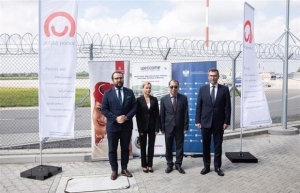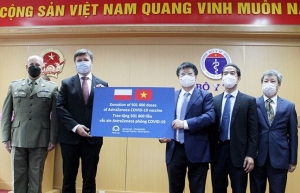Vietnam and Poland ramp up robust economic cooperation
Could you share some light on the development of the Vietnamese-Polish bilateral economic relationship during recent years?
 |
| Piotr Harasimowicz, chief representative officer at the Polish Investment and Trade Agency |
Bilateral economic relations have been developing on many levels for years and the value of trade turnover is also systematically increasing. In 2021, trade between Poland and Vietnam exceeded $4.6 billion, and this is a quarter more than the year before. Vietnam is Poland’s largest trading partner in Southeast Asia. In 2021, goods worth over $500 million were exported from Poland to Vietnam.
In the first half of 2022, Polish exports to Vietnam were dominated by machines and mechanical devices as well as electronic equipment and their parts, base metals and articles made of these metals, agri-food products, and chemical industry products.
The structure of imports from Vietnam did not change significantly – electrical and electronic products and devices dominated (primarily telephony and telecommunications apparatus, parts and assemblies for telephones and smartphones, as well as radio and television receivers, monitors, projectors).
Among the most important groups of products imported to Poland, there were also light industry products (footwear and clothing), as well as agri-food products (such as coffee or fruit).
Although implemented on a small scale, investment shows an upward trend. There are over 250 companies with Vietnamese capital in Poland, but these are mostly micro-enterprises employing a maximum of a few people. Larger projects include the investment of the TAN-VIET group in the VIFON company, which produces instant soups and pasta.
The value of Polish foreign investments registered in Vietnam until December 2022, according to data by the Ministry of Planning and Investment, totals $422.97 million and includes 29 projects. Poland has its potential additional assets when it comes to developing investment relations with Vietnam.
Vietnam is a gateway for Polish companies to the Southeast Asian market. How do you see the interest of Polish companies in expanding their presence here in 2023?
Almost 100 million people live in Vietnam and the middle class is developing. Both Poland and Vietnam have large domestic markets and open economies. As an export-oriented economy and attracting foreign investment, Vietnam has a network of free trade agreements.
Since August 2020, a free trade agreement has been in force between Vietnam and the European Union (EVFTA). The agreement virtually eliminates customs duties, including transitional periods for sensitive goods, and simplifies procedures. It can be seen that this is a genuine breakthrough as trade has been growing strongly since the entry into force of the agreement.
Due to the aid during the war, which in Vietnam is called American and after it, and due to the presence of the diaspora, Poland is treated as a traditionally friendly country. Among the Vietnamese elite, there are several thousand graduates of Polish universities, mainly from the 1970s. Most of these people are retiring, but good associations with Poland are still alive in Vietnam.
It is recognised that Vietnam may be one of the winners of the US-China trade rivalry and rising labour costs in China, while the centre of smartphone production is in Vietnam.
There is ample potential for Vietnamese and Polish cooperation in agriculture and food. Could you share more about the partnership between two countries in this field?
Currently, a large part of Polish products in these groups has access to the Vietnamese market, but there are still various limitations.
Polish exporters have permission to sell pork, poultry, and seafood to Vietnam. Currently, the procedure of obtaining permission to export Polish beef is in progress. The export of these products involves a long procedure, allowing a specific type of meat to enter the market and certifying a specific producer as an exporter.
Due to African swine fever occurring in Poland, the Vietnamese veterinary services have introduced restrictions on exports from the provinces affected by the disease. It was possible to avoid the ban on the whole of Poland, although these were the original intentions of the Vietnamese veterinary services. The situation regarding bird flu in poultry is also being monitored.
As a result of the EVFTA, tariffs on frozen pork are to be removed by August 2027, on fresh pork and offal by 2029, and on poultry and poultry offal by 2030.
Despite the above barriers, Poland is an important exporter of meat to Vietnam. According to Vietnamese statistics covering the first nine months of 2021, Poland exported to Vietnam around 16,000 tonnes of pork, making it the third-largest exporter of pork to Vietnam.
In the same period, it exported 3,000 tonnes of poultry, which made Poland fourth in terms of poultry exports to Vietnam. In this product group, there are potential opportunities to expand the assortment with meat products, such as cold cuts and various sausages.
In addition, Polish milk and dairy products have been exported to Vietnam since 2003. Milk produced by Mlekovita can be bought in Vietnam, while the possible development of exports in this group could concern cheese and butter, which are expensive in Vietnam. As a result of the EVFTA, duties on dairy products are to be lifted by mid-2025.
Polish apples have been exported to Vietnam since 2015, while the procedure for highbush blueberry is in progress. The export of fresh fruit and vegetables requires compliance with strict phytosanitary procedures. Polish apples have a good price and the Vietnamese also appreciate their natural smell, but generally prefer crunchy and sweet apples.
There is also potential to increase imports of Polish apples to Vietnam. An opportunity to increase fruit sales can also be seen in the growing demand for new imported products, such as cherries, blueberries, and pears.
 | Poland hands over COVID-19 vaccine batch to Vietnam A batch of 501,600 COVID-19 vaccine doses donated by the Polish Government was handed over to Vietnam at a ceremony held at Warsaw Chopin on August 20. |
 | Cooperation between Poland and Vietnam reaching new heights in time of adversity Over the past year and a half, the COVID-19 pandemic has affected a great number of people across the globe. This period will undoubtedly be remembered in most countries as filled with adversity and suffering. But a redeeming feature of this challenging time has been our ability to forge stronger relations. |
 | Russia to cut Poland, Bulgaria gas over Ukraine Russia will halt gas shipments to Poland and Bulgaria on Wednesday, after blasts in a breakaway region of neighbouring Moldova led Kyiv to accuse Moscow of seeking to expand the Ukraine war further into Europe. |
What the stars mean:
★ Poor ★ ★ Promising ★★★ Good ★★★★ Very good ★★★★★ Exceptional
Related Contents
Latest News
More News
- Hermes joins Long Thanh cargo terminal development (February 04, 2026 | 15:59)
- SCG enhances production and distribution in Vietnam (February 04, 2026 | 08:00)
- UNIVACCO strengthens Asia expansion with Vietnam facility (February 03, 2026 | 08:00)
- Cai Mep Ha Port project wins approval with $1.95bn investment (February 02, 2026 | 16:17)
- Repositioning Vietnam in Asia’s manufacturing race (February 02, 2026 | 16:00)
- Manufacturing growth remains solid in early 2026 (February 02, 2026 | 15:28)
- Navigating venture capital trends across the continent (February 02, 2026 | 14:00)
- Motivations to achieve high growth (February 02, 2026 | 11:00)
- Capacity and regulations among British areas of expertise in IFCs (February 02, 2026 | 09:09)
- Transition underway in German investment across Vietnam (February 02, 2026 | 08:00)

 Tag:
Tag:




















 Mobile Version
Mobile Version